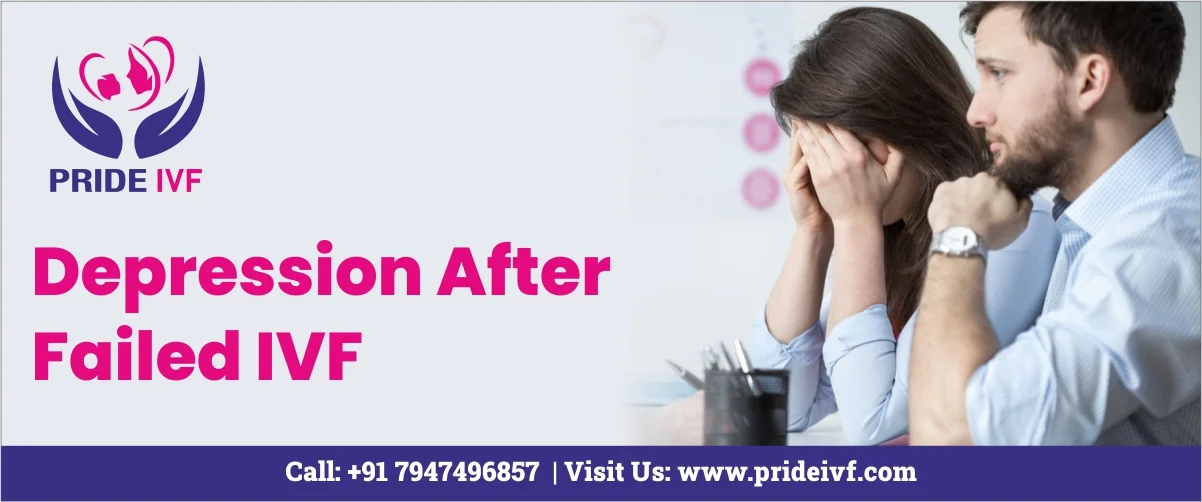In Vitro Fertilisation of IVF is an artificial reproductive technology (ART) procedure that allows individuals or couples to experience parenthood. While mostly successful, the process could fail in some cases. Couples and individuals may experience a range of emotions following an unsuccessful IVF cycle. Most women often experience depression after their IVF cycle. Depression is a personal experience that varies from person to person.
In this blog, Pride IVF experts will discuss depression after failed IVF, ways to cope with it, and how Pride IVF can help you.




What Causes IVF to Fail?
Before moving on to depression after a failed IVF, and the ways to cope from it, let us first discuss the factors that can cause IVF to fail:
- Age-related problems: The success rate of IVF is significantly influenced by advanced maternal age. Women’s ovarian reserves decrease with age, producing fewer and poorer-quality eggs, which can have an impact on the quality and implantation of embryos.
- Egg quality: While many eggs may be successfully extracted for IVF, some may have chromosomal abnormalities that reduce their likelihood of developing into viable embryos. Low-quality eggs may result in unsuccessful fertilisation or premature pregnancy loss.
- Sperm quality: Failure of IVF can also be attributed to male factor infertility, low motility, and low sperm count.
- Ovarian response: The fertility medications used to increase egg production may occasionally cause the ovaries to react insufficiently. This may result in fewer eggs being recovered, which often lowers the likelihood of developing viable embryos.
- Embryo quality: Not every embryo is viable even after fertilisation. Certain embryos might not develop correctly or have genetic defects, which could lead to an early miscarriage or unsuccessful implantation.
- Receptivity of the endometrium: The success of implantation can be impacted by an out-of-sync endometrial receptivity window and the critical timing of embryo transfer. It is crucial that the embryo and the uterine lining work properly.
- Implant-related problems: It is necessary for embryos to successfully implant into the uterine lining for a pregnancy to succeed. However, implantation may be hampered by uterine anomalies, a thin endometrial lining, or an immune system reaction. Something else may lead to an IVF implantation failure.
- PCOS, or polycystic ovarian syndrome: IVF success rates are lower in women with PCOS because of irregular ovulation, hormonal imbalances, and difficulties implantation of the embryo.
- Abnormalities of the uterus: Obstetrical structural conditions, such as fibroids or adhesions, can obstruct the implantation of embryos and the growth of pregnant women.
- Lifestyle factors: Because they may alter hormone levels and egg quality, smoking, binge drinking, and obesity can have a negative effect on the results of in vitro fertilisation. Additionally, some food items may have a detrimental effect on implantation, which could result in an early miscarriage after a successful IVF.
- Problems relating to medication: Unsuitable egg development or ovulation may arise from mishandling the dosage of fertility medications or from individual reactions to them.
- Failed fertilisation: Although the sperm and egg are viable, fertilisation may not always happen spontaneously or through traditional IVF techniques. Intracytoplasmic sperm injection, or ICSI, may be advised in certain circumstances. Also Read: Natural Pregnancy After Failed IVF
What Depression After Failed IVF Feels Like?
Here’s what depression can feel like after a failed IVF:
- Feeling Grief and Loss: A lot of people and couples devote a lot of hope, effort, and money to the IVF procedure. They might feel a deep sense of loss, similar to mourning the passing of a dream or the absence of a future they had imagined, if it doesn’t end in a successful pregnancy. Also Read: Stages Of Grief After Failed IVF.
- Guilt and Self-Blame: People going through IVF may struggle with feelings of guilt and self-blame, questioning whether they did something incorrectly or whether there was anything more they could have done to guarantee a different result.
- Having Sadness and Disappointment: When IVF fails, it can cause intense sadness and disappointment. Not only is there the loss of a possible pregnancy to consider, but the procedure also brought with it dashed hopes and expectations for the future.
- Choosing Isolation: Many people still feel alone and misunderstood in their experiences, even in spite of the growing transparency surrounding infertility issues. These feelings of loneliness may further increase due to the failure of IVF since it may be difficult for them to find others who genuinely comprehend what they’re going through.
- Feeling a Loss of Purpose in Life: For some people, undergoing infertility treatments takes up their entire life, reshaping their identity and sense of direction. They might feel lost after IVF fails (Why IVF Fails?), not knowing who they are or why they are doing this in the first place.
- Impact on Relationships: Infertility can put a strain on even the most solid partnerships, and unsuccessful IVF treatments can make things worse. Couples who are grieving and disappointed with one another may find it difficult to support one another
Lets get started
How to Cope With Depression After Failed IVF?
IVF may not be successful in each case. While it may trigger a range of emotions, and even depression, it’s important to know how to deal with them. Here are some ways in which you can cope from depression after a failed IVF cycle, and get back to your normal life.
- Seek Professional Counselling: Talking to a therapist can provide a safe space to express your emotions and navigate the grieving process.
- Give Yourself Time to Heal: Allow yourself to process feelings of sadness and disappointment through writing, therapy, or engaging in activities that bring you comfort.
- Get Support from Family & Friends: Lean on loved ones for emotional support and open up about your feelings. Strengthening communication with your partner can also be beneficial.
- Practice Self-Care: Prioritize self-care by seeking counselling, spending time outdoors, and practicing relaxation techniques like yoga (fertility yoga poses) or meditation.
- Discuss Next Steps with Your Doctor: Schedule an appointment with your fertility specialist to understand the reasons for the failed cycle and explore alternative options. Also Read: 3 Failed IVF Cycles? What Next?
- Explore Different Routes to Parenthood: Consider adoption, donor conception, or surrogacy as alternative paths to parenthood.
- Don’t Give Up: Remember, there are still options available, and maintaining hope is key to exploring them.
How Pride IVF Can Help You?
For individuals or couples who’ve had a failed IVF cycle, Pride IVF provides comprehensive care and comfort. there are certain Questions to Ask IVF Doctor After a Failed Cycle. Here’s how we can help you cope with depression after a failed IVF:
- Providing Compassionate Care: Following an unsuccessful IVF cycle, our doctors offer patients who are depressed compassionate and understanding care. Patients may feel more supported and less alone in their struggles when you show empathy for their feelings.
- Information and Education: We discuss with the patients the psychological difficulties brought on by infertility and unsuccessful IVF treatments. Our fertility specialists help patients feel less alone or guilty by reassuring them that emotions like sadness, despair, and depression are normal reactions.
- Referrals to Mental Health Professionals: Our doctors recommend patients to mental health practitioners who specialize in treating depression and issues related to infertility, such as therapists or counselors. These experts can provide coping mechanisms, counseling, and support based on the needs of the individual.
- Prescription Medicine: Doctors occasionally write prescriptions for antidepressants or other medications to help treat depression symptoms. To guarantee the best results, they keep an eye on how the patient is responding to their medication and modify the treatment plan as necessary. Also, if a patients has hormone imbalance after failed IVF, which may cause mood swings, the doctors also provide medication for that. (Hormone Imbalance After Failed IVF)
- Keeping an Eye on Your Physical Health: Depression can exhibit physical symptoms as well such as increase in appetite, sleep issues, or exhaustion. Our doctors monitor the physical well-being of the patients and handle any issues or problems that might develop as a result of depression.
- Providing Supportive Counselling: During follow-up visits, our doctors offer supportive counselling, which gives patients a safe, accepting space to express their emotions and worries. Patients may feel more supported, heard, and understood as they work through their feelings thanks to this.
- Working Together with Other Healthcare Professionals: To guarantee that patients have access to all-encompassing and holistic care for their mental and emotional health, our fertility specialists work with other healthcare professionals, such as psychologists, social workers, or support groups.




